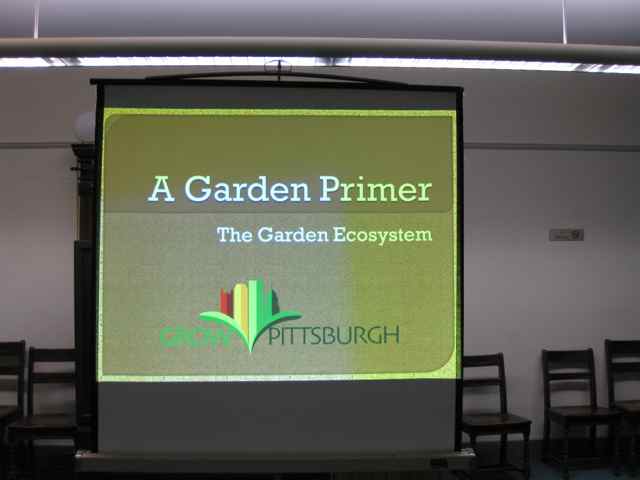Learning about gardening from Grow Pittsburgh

Yesterday, Abby and I finished the third and final session of “A Garden Primer”, a basic course on organic gardening offered by Grow Pittsburgh. We took this course because we would like to start our own little urban garden.

As an utter beginner with no experience, I thought the course was a very useful and friendly introduction to organic gardening.
Our goal
Abby and I have a small front yard which we would like to use to grow vegetables to eat. Although we are subscribers to a CSA, Kretschmann Farm, we could always use more vegetables to eat, especially since we have increased their proportion in our diet relative to the proportion of grains we formerly consumed.
Attendance
There were about 25-30 of us in this three-week course, which met for two hours each Thursday evening at the East Liberty Presbyterian Church. There was a mix of people who participated: mostly young people in their twenties, but also older folks as well; most of us are from the city, but there were also those from further out with more space. Some already had serious gardening experience, while some were total novices.
Dinner was included, a nice touch given everyone’s busy schedules: burritos provided by Chipotle.
Format
The format of the course was that there were lectures with slide presentations, during which we were free to ask questions, and we received a 90-page reference manual at the beginning of the course that goes into much more detail about topics and is designed for reference when we actually start getting our hands dirty (I took some notes in my copy during lectures).
For the second two weeks, we had homework in which we each came up with a preliminary design for our garden and discussed it in class, and homework in which we decided what to grow and discussed that.
We also received a seed catalog so that we could learn what criteria to look for when selecting seeds.
Syllabus
A fundamental goal of the course, emphasized repeatedly, was to learn to grow in a way that is constructive to the land in the long run, rather than stripping resources from it in a short-term way.
Therefore, the first thing we learned about was how to compost, and use compost as the basis of a healthy soil.
Then we learned about how to choose a location for a garden, and discussed different ways of constructing one. Many useful suggestions were provided for materials.
We learned about the seasons and life cycles of seeding, transplanting, harvesting.
Finally, we learned about thinking of the whole ecosystem: how to deal with the real issues of pests, disease, and weeds without just getting out the machine gun and using nasty chemicals. We discussed mulching, crop rotation, taking advantage of beneficial insects (which will eat up the pests that actually harm leaves and fruit and roots).
Advice on garden maintenance and winding down the season ended the course.
Our plan
Abby and I have yet to test the soil in the front yard, but in any case, we may go for a raised bed instead of an in-ground garden. We are thinking of a 12-by-3 foot area to use in the front yard. We will do more study and preparation before the spring comes.
Conclusion
Doing some serious gardening will be a new adventure for Abby and me. I am grateful that Grow Pittsburgh has promoted urban gardening for local food production, and spread the word so that more of us in the city can comfortably start getting involved ourselves. I highly recommend the “Garden Primer” course to anyone who is a novice at organic gardening (whether urban or suburban or rural).
Note: the course is being offered again this winter two more times, so there is still time to jump in for this year:
- Tuesdays: February 7, 14, 21
- Mondays: March 12, 19, 26

I have always heard that if your garden is going to be anywhere near a structure, you want to go with raised beds because the paint etc from the structure (your house) has leached all sorts of nasties into the ground. But then it also depends from what you build the raised bed. The punks have always used old tires but tires themselves are nasty. The advice I've heard is that tires are ok for ornamental gardening, but not for food. I'd be interested to hear what recommendations you get for building materials for raised bed. Almost everyone up here does raised beds because the ground is too cold. How is the sunlight to your front yard? We don't have any direct sunlight around our cabin.